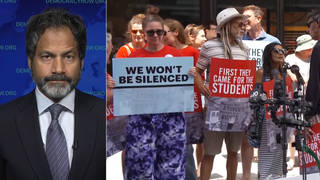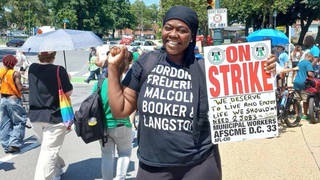HeadlinesJanuary 06, 2014
Iraq Loses Control of Fallujah, Key Site in U.S. War
Iraq’s prime minister is urging residents of Fallujah to rise up against al-Qaeda-linked militants after the government lost control of the city. Swaths of Fallujah are now reportedly in the hands of militants with the Islamic State of Iraq and the Levant. Shifting loyalties among tribal militias fighting alongside the government are complicating the picture. Militants are also holding parts of the nearby provincial capital Ramadi. It is the first time militants have so overtly claimed key cities since the peak of fighting after the 2003 U.S. invasion. On Sunday, Secretary of State John Kerry ruled out any possibility of sending in U.S. troops.
John Kerry: “Now, we’re going to do everything that is possible to help them, and I will not go into the details, except to say that we’re in contact with tribal leaders from Anbar province whom we know, who are showing great courage in standing up against this as they reject terrorist groups from their cities. And this is a fight that belongs to the Iraqis. That is exactly what the president and the world decided some time ago when we left Iraq. So, we are not, obviously, contemplating returning. We’re not contemplating putting boots on the ground. This is their fight, but we’re going to help them in their fight.”
A decade ago, Fallujah was the site of the bloodiest chapter for U.S. troops since the Vietnam War. The U.S. push to recapture Fallujah in 2004 involved the extensive use of depleted uranium and white phosphorus, leaving a legacy of birth defects that continues today.
Syria Rebels Battle Al-Qaeda-Linked Fighters
In neighboring Syria, anti-government rebels are battling militants from the the same al-Qaeda-linked group. Clashes between the factions erupted across northern Syria over the weekend and spread to the key eastern city of Raqqa earlier today.
Afghanistan: Violence Against Women Hits Record High
In Afghanistan, violence against women has hit a record high. Afghanistan’s Human Rights Commission says attacks against women increased in both frequency and brutality in 2013. The head of the commission, Sima Samar, and Suraya Pakzad, a top advocate for women’s rights, discussed the violence.
Sima Samar: “I think the problem is the brutality of the violence against women was really shocking this year, including the cutting of the nose and lips of women, including mass rape in public space, which is shocking in our culture.”
Suraya Pakzad: “Government is not that much strong here in the whole country, and law is not enforced. Still gaps are everywhere, and everybody can do anything. And assassination of women, recently you are hearing from Afghanistan that it is an easy thing for anyone, if they would like to do that. There is no punishment.”
The report comes as Afghanistan is preparing for the departure of foreign aid as well as foreign troops at the end of this year. It is unclear how many U.S. troops — and how much U.S. aid — will remain in Afghanistan amid tensions over a long-term troop deal. The promotion of women’s rights was touted as a key pretext for the U.S.-led occupation. But in a further sign such rights have deteriorated, doctors are reporting a rise in self-immolations by women. According to Reuters, the burn unit of one hospital admitted a record number of women who tried to set themselves on fire in 2012. The plight of children in Afghanistan has also worsened. U.N. data shows cases of severe malnutrition among children have risen by at least 50 percent over 2012 levels.
“Polar Vortex” Brings Life-Threatening Cold to U.S.
A so-called polar vortex is blasting much of the United States, with swaths of the country set to record some of their lowest temperatures in decades. Wind chills are projected to drop as low as -70 degrees Fahrenheit in the Midwest. The National Weather Service called the blast “historic and life-threatening,” warning the wind chills are cold enough to freeze human flesh within five minutes. Below-zero temperatures were predicted as far south as Alabama, with nearly half the country set to plunge below freezing by Wednesday. Indianapolis Mayor Greg Ballard warned residents to take precautions.
Mayor Greg Ballard: “This weather combination that we’re seeing right now with all of the snow and the cold is unlike anything that we’ve seen in decades in this area, and I can’t emphasize that enough. The cold really scares me, and as such that we will have temperatures that are potentially deadly or certainly life-altering temperatures right now, and we have to be very, very careful with that.”
The cold blast comes after at least 16 people died from a winter storm that brought snow and freezing temperatures to the Midwest and Northeast.
Australia Suffers Hottest Year on Record
While the United States freezes, Australia has been suffering a blazing heat wave that saw temperatures hovering around 50 degrees Celsius — or 122 degrees Fahrenheit. Last year was Australia’s hottest year on record. Recently elected Prime Minister Tony Abbott has eliminated Australia’s Climate Change Commission and vowed to undo measures to reduce greenhouse gas emissions.
30,000 African Migrants Protest Detention Law in Israel
In Israel, African migrants marched in protest Sunday against a new law that allows those without valid visas to be detained indefinitely. At least 300 people have reportedly been arrested since the law passed last month. Police said more than 30,000 migrants joined the march in Tel Aviv in their largest action to date. A demonstrator from Eritrea outlined their demands.
Daud Nemos: “We are asking that the Israeli government (do) three simple things: First is to cancel the new law and release all the prisoners; second is to check our asylum requests in a fair and transparent way; third is to give the basic human rights, including a right to work, a right for health service and so on.”
Kerry: Saudi King Voices “Enthusiastic Support” for Peace Talks
The protest in Israel came as Secretary of State John Kerry left Israel for Jordan and then Saudi Arabia as part of his push for a peace deal between Israelis and Palestinians. Speaking in Riyadh, Kerry said Saudi King Abdullah had voiced “enthusiastic support” for the peace talks.
Egypt Court Sentences 12 Activists to Suspended Jail Terms
In Egypt, a court has sentenced 12 activists to one-year suspended jail terms, purportedly over an attack on the headquarters of a losing presidential candidate in 2012. Those sentenced include the sibling pair Alaa Abd El-Fattah and Mona Seif, key figures in the 2011 uprising that ousted Hosni Mubarak. Mona Seif condemned the verdict.
Mona Seif: “The verdict was political. We were given one-year suspended sentences. The case has 12 defendants even though there isn’t evidence or witnesses to prove that any of these defendants are guilty.”
The sentences are part of an ongoing crackdown that saw three other top activists sentenced to three-year terms last month. On Friday, at least 17 people were killed in the deadliest clashes in months between security forces and supporters of ousted President Mohamed Morsi.
Boeing Workers Accept Major Concessions to Keep 777X in Washington
In Washington state, the 30,000-member union of machinists has narrowly accepted a new contract from Boeing that includes major concessions on pensions, healthcare benefits and wage growth. The union had rejected Boeing’s previous offer by 67 percent in November. Boeing then began soliciting bids from other states to host production of its 777X aircraft. The firm also tweaked its offer, adding an additional $5,000 bonus. On Friday, the union accepted the new contract with just 51 percent voting in favor. To entice Boeing, Washington state had approved the largest corporate tax break by a state to a single corporation in U.S. history. The measure hands Boeing $8.7 billion worth of incentives through 2040 to build the its new aircraft in Washington. We’ll have more on the Boeing vote with Seattle’s new Socialist city council member, Kshama Sawant, later in the broadcast.
NSA Declines to Specify Whether It’s Spying on Congress
The National Security Agency has declined to specify whether or not it is spying on Congress. In response to an inquiry by Independent Vermont Sen. Bernie Sanders, the NSA said members of Congress have “the same privacy protections as all U.S. persons.” Republican Sen. Rand Paul, meanwhile, has announced he is filing a class action lawsuit against the NSA over its bulk collection of Americans’ phone records. On Friday, the secret Foreign Intelligence Surveillance Court authorized the bulk spying program for another 90 days.
Report: Oil in ND Train Explosion Contained High Levels of Flammable Chemicals
Newly published documents show oil on board a train that exploded in Casselton, North Dakota, contained high levels of flammable and toxic chemicals not found in other types of oil. DeSmogBlog reports the company due to receive the cargo had a special permit noting the oil contained high levels of volatile organic compounds. The report comes after federal transportation officials issued a warning about the oil, which comes from the Bakken shale reserve that stretches under North Dakota and Montana, saying it may be more flammable than other types of oil. The explosion in North Dakota forced the evacuation of a small town. A previous train derailment involving Bakken shale oil killed 47 people in Quebec.
AP: States Confirm Oil, Gas Drilling Contaminates Well Water
The Associated Press reports a number of U.S. states have confirmed oil and gas drilling is polluting well water. The report examined four states that have received hundreds of complaints. In Pennsylvania, for example, authorities have confirmed more than 100 cases of drilling contaminating private wells since 2005. The state received nearly 400 complaints about contamination last year alone, down from nearly 500 in 2012.
USDA Proposes Lifting Restrictions on GMO Corn, Soybean Seeds
U.S. agricultural regulators have proposed lifting restrictions on genetically modified corn and soybean seeds that are resistant to the weed killer 2,4-D. The herbicide is made by Dow Chemical and has been linked to a range of health risks including cancer and Parkinson’s disease. It was one ingredient in the toxic Vietnam War herbicide Agent Orange. The proposal to lift restrictions comes amid pressure from farmers after many weeds grew resistant to Monsanto’s Roundup Ready weed killer. Critics say the herbicide often drifts from its application site, posing a risk to health and nearby plants.
Appeals Court Considers Texas Rule That Shuttered Abortion Clinics
A federal appeals court in New Orleans is hearing arguments today on a Texas provision requiring abortion providers to obtain admitting privileges at a nearby hospital. The requirement forced a third of Texas clinics to stop performing abortions immediately after an appeals court allowed it to take effect two months ago. A judge had earlier ruled it served no medical purpose. According to the Guttmacher Institute, 70 anti-abortion restrictions were enacted by 22 states last year. Over the past three years, states have passed some 200 restrictions on abortion, more than in the entire previous decade.
Most popular
- 1
- 2
- 3
- 4
Non-commercial news needs your support
Please do your part today.












Media Options